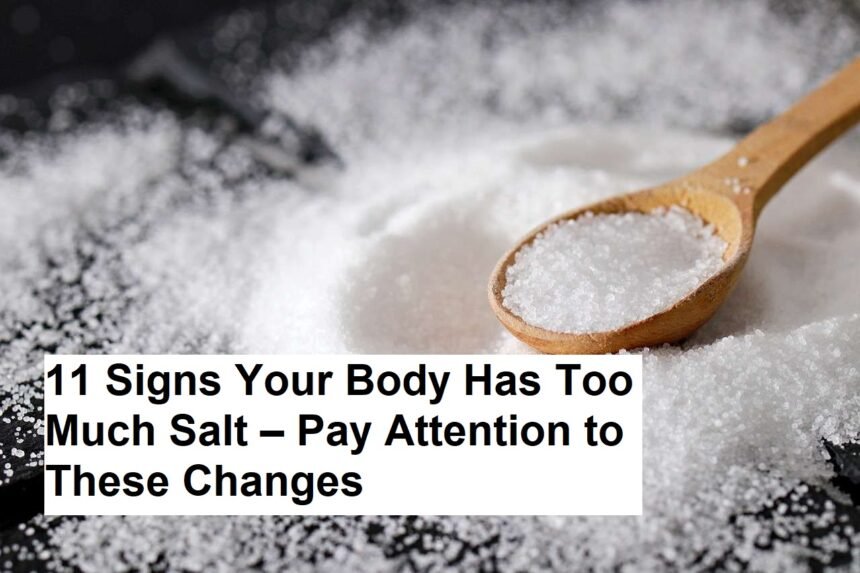Introduction
Salt is one of the most common ingredients in our daily meals. A pinch of it makes food taste better, but consuming too much can quietly harm your health. The tricky part? Most people don’t realize when their body is overloaded with salt.
In this article, we’ll uncover 11 signs your body has too much salt, pay attention to these changes. We’ll also look at scientific explanations from doctors about the dangers of excess salt and share simple tips to manage your salt intake before it becomes a bigger problem.
Why Too Much Salt Is Dangerous
Scientific Explanation from Doctors
Doctors explain that salt contains sodium, a mineral the body needs to regulate fluid balance, nerve function, and muscle contractions. However, when sodium levels rise too high, the body struggles to maintain balance. This leads to water retention, high blood pressure, kidney stress, and increased risk of heart disease.
The World Health Organization recommends less than 5 grams of salt per day (around one teaspoon). Yet studies show that many people consume nearly double this amount, often without realizing it—especially from processed foods, snacks, and restaurant meals.
11 Signs Your Body Has Too Much Salt – Pay Attention to These Changes
1. Constant Thirst
Too much salt pulls water from your cells, leaving you dehydrated. If you feel thirsty even after drinking plenty of water, your salt intake might be too high.
2. Swollen Hands, Feet, or Face
Excess sodium makes your body retain water. This can cause puffiness or swelling, especially around your fingers, ankles, or under your eyes.
3. Frequent Headaches
High sodium levels can narrow blood vessels and increase blood pressure. This extra pressure may trigger headaches or migraines.
4. High Blood Pressure
One of the most common signs of excess salt is rising blood pressure. If your blood pressure is consistently above normal, check your salt intake.
5. Bloating and Digestive Discomfort
Feeling bloated after meals isn’t always about overeating. High salt levels cause the body to hold onto water, creating that uncomfortable “full” sensation.
6. Trouble Sleeping
Studies suggest that a high-salt diet can interfere with sleep quality, making it harder to fall or stay asleep. You may wake up frequently or feel restless at night.
7. Frequent Urination
Too much salt makes your kidneys work harder to filter sodium out of your blood. This can lead to increased trips to the bathroom, especially at night.
8. Muscle Cramps or Weakness
An imbalance of sodium and other minerals like potassium can cause muscles to spasm, cramp, or feel unusually weak.
9. Brain Fog and Poor Concentration
High salt intake has been linked to reduced blood flow to the brain, which may leave you feeling sluggish, forgetful, or unable to focus.
10. Persistent Cravings for Salty Foods
Believe it or not, eating too much salt can make you crave even more. Your taste buds adapt, meaning normal food tastes bland without extra salt.
11. Skin Problems
Excess sodium can dry out your skin, leading to dullness or irritation. In some cases, people may even notice increased breakouts due to fluid imbalance.
Early Warning Signs You Shouldn’t Ignore
The early signs of too much salt—like thirst, puffiness, and bloating—often go unnoticed or are brushed off as minor. But ignoring them may lead to more serious issues like chronic high blood pressure, kidney disease, and heart problems. Recognizing these signals early is key to protecting your long-term health.
Practical Steps to Reduce Salt Intake
Step 1: Check Food Labels
Processed and packaged foods are the biggest hidden sources of salt. Get into the habit of reading labels and choosing lower-sodium options.
Step 2: Cook at Home More Often
When you cook at home, you control how much salt goes into your meals. Try using herbs, spices, or lemon juice for flavor instead of always reaching for the salt shaker.
Step 3: Stay Hydrated
Drinking enough water helps your kidneys flush out excess sodium, reducing bloating and swelling.
Step 4: Balance Sodium with Potassium
Foods rich in potassium—like bananas, spinach, and sweet potatoes—help counteract the effects of sodium in the body.
Step 5: Limit Processed Snacks
Chips, instant noodles, fast food, and canned soups are salt traps. Replace them with healthier alternatives like nuts, fresh fruit, or homemade meals.
Key Takeaway
Salt is essential, but too much of it silently harms your body. From bloating and swelling to high blood pressure and brain fog, these 11 signs of too much salt are your body’s way of sounding the alarm. The earlier you recognize and respond to them, the better your chances of preventing long-term health risks.
Final Thoughts
Now that you know the 11 signs your body has too much salt, it’s time to pay closer attention to your diet. Small changes—like checking food labels, cooking at home, and staying hydrated—can make a big difference in your overall health.
Have you noticed any of these signs in yourself lately? Share your experience in the comments below and let’s help each other build healthier, salt-smart lifestyles!












